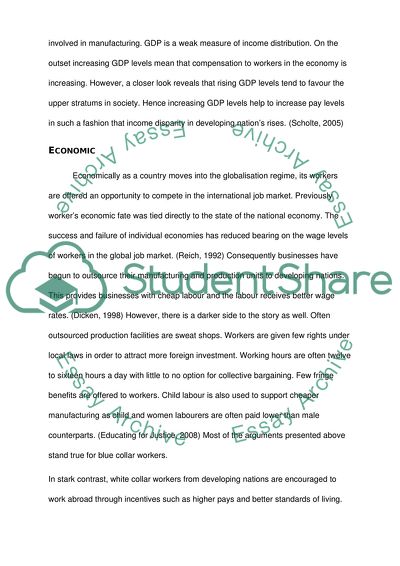Cite this document
(“The Growth of Globalization Coursework Example | Topics and Well Written Essays - 1500 words”, n.d.)
The Growth of Globalization Coursework Example | Topics and Well Written Essays - 1500 words. Retrieved from https://studentshare.org/sociology/1579201-offer-a-critical-evaluation-of-the-growth-of-globalization-in-terms-of-its-benefits-and-detriment-to-developing-countries-justify-your-view-with-references-to-clear-relevant-examples
The Growth of Globalization Coursework Example | Topics and Well Written Essays - 1500 words. Retrieved from https://studentshare.org/sociology/1579201-offer-a-critical-evaluation-of-the-growth-of-globalization-in-terms-of-its-benefits-and-detriment-to-developing-countries-justify-your-view-with-references-to-clear-relevant-examples
(The Growth of Globalization Coursework Example | Topics and Well Written Essays - 1500 Words)
The Growth of Globalization Coursework Example | Topics and Well Written Essays - 1500 Words. https://studentshare.org/sociology/1579201-offer-a-critical-evaluation-of-the-growth-of-globalization-in-terms-of-its-benefits-and-detriment-to-developing-countries-justify-your-view-with-references-to-clear-relevant-examples.
The Growth of Globalization Coursework Example | Topics and Well Written Essays - 1500 Words. https://studentshare.org/sociology/1579201-offer-a-critical-evaluation-of-the-growth-of-globalization-in-terms-of-its-benefits-and-detriment-to-developing-countries-justify-your-view-with-references-to-clear-relevant-examples.
“The Growth of Globalization Coursework Example | Topics and Well Written Essays - 1500 Words”, n.d. https://studentshare.org/sociology/1579201-offer-a-critical-evaluation-of-the-growth-of-globalization-in-terms-of-its-benefits-and-detriment-to-developing-countries-justify-your-view-with-references-to-clear-relevant-examples.


